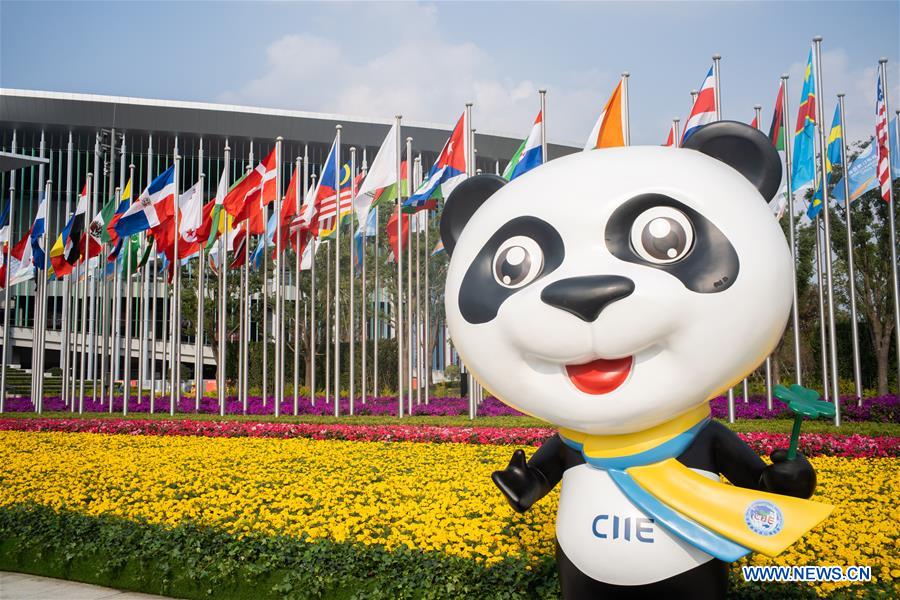


Photo shows Jinbao, mascot of the China International Import Expo (CIIE), at the south square of the National Exhibition and Convention Center (Shanghai), the main venue for the second CIIE, in Shanghai, east China, Nov. 4, 2019. The second CIIE is scheduled to run from Nov. 5 to Nov. 10 in Shanghai. (Xinhua/Zhang Xiaoyu)
China's super-scale consumer market has lately drawn global attention. At the beginning of November, 71.13 billion U.S. dollars worth of tentative deals were reached for one-year purchases of goods and services at the second China International Import Expo, an increase of 23 percent compared with the first one held last year.
Then on November 11, China's annual shopping festival, major e-commerce platforms achieved record-high sales. China is shifting from the world's factory to the global market, demonstrating enormous consumption potential.
Strong consumption reflects the resilience and vitality of the Chinese economy. Statistics released recently suggest that major economic indicators such as growth, employment, consumer prices and balance of payments remained within a reasonable range in the first ten months.
Although some indicators fluctuated in a short term and external uncertainties are mounting, China has overall achieved a stable performance while at the same time securing progress in its economic development.
It is necessary to view China's economic development against the background of world economy.
China's economy maintained medium-high growth of 6.2 percent in the first three quarters of this year in spite of the sluggish world economy. While the growth in international trade continues to decline and trade frictions have yet been solved, China's import and export maintained considerable growth in the January-October period. In addition, the use of foreign investment increased 6.5 percent year on year in the first three quarters despite the slowdown of global capital flows.
From a global perspective, China has managed to buck the trend of the recession and remain the top among major countries as regards economic development.
It is agreed by many experts in the business world that short-term indicators alone won't suffice to view the Chinese economy. To look at it in the long run and in a strategic way is very much needed.
China is well positioned to cope with temporary fluctuations and gain advantages for long-term development.
After years of development, the country has accumulated a solid material and technological foundation, with improving infrastructure and industrial systems, increasing human resources and high-quality talents and growing domestic market.
China also has a unique edge, which is the good size of the country. China is large geographically and flexible politically, which leaves it plenty of room for adjustments to adapt to changes.
China is fully capable of completing in-depth economic adjustment and promoting economic development, transformation and upgrading.
According to statistics, although the growth of fixed asset investment slowed down slightly in the first 10 months, investment in high-tech industries maintained double-digit growth, including the high-tech manufacturing and high-tech services, both up by about 14 percent.
These results show that under the downward pressure, the Chinese economy is experiencing more significant and far-reaching changes, which is the upgrading of industries and the transformation of growth drivers.
By continuing with the supply-side structural reform, changing the growth model and restructuring the economy, China is able to address deep-seated and structural problems in the economy and seek long-term advantages out of temporary downturn, laying a solid foundation for sustained and sound economic development.
Only by growing together with China can the whole world embrace a brighter future.
Since the international financial crisis, the economic community has already reached consensus that anyone who rejects China is actually giving up the opportunities of the Chinese market and that investing in China is investing in the future.
China has made great economic achievements, yet it still has a lot of potential for development. The numerous fluctuations in the economic history have made it clear that whoever laughs last, laughs best. As long as the world looks at the Chinese economy from the long run, it will surely win more opportunities for development and grow together with China.
Chinese economy is a sea, not a pond. With more confidence and patience, the world will be able to view the Chinese economy from a long-term perspective, without being influenced by temporary fluctuations and doubts.
This will build up determination and momentum for reform, and help transform and upgrade the Chinese economy to a higher level.
 Fire brigade in Shanghai holds group wedding
Fire brigade in Shanghai holds group wedding Tourists enjoy ice sculptures in Datan Town, north China
Tourists enjoy ice sculptures in Datan Town, north China Sunset scenery of Dayan Pagoda in Xi'an
Sunset scenery of Dayan Pagoda in Xi'an Tourists have fun at scenic spot in Nanlong Town, NW China
Tourists have fun at scenic spot in Nanlong Town, NW China Harbin attracts tourists by making best use of ice in winter
Harbin attracts tourists by making best use of ice in winter In pics: FIS Alpine Ski Women's World Cup Slalom
In pics: FIS Alpine Ski Women's World Cup Slalom Black-necked cranes rest at reservoir in Lhunzhub County, Lhasa
Black-necked cranes rest at reservoir in Lhunzhub County, Lhasa China's FAST telescope will be available to foreign scientists in April
China's FAST telescope will be available to foreign scientists in April "She power" plays indispensable role in poverty alleviation
"She power" plays indispensable role in poverty alleviation Top 10 world news events of People's Daily in 2020
Top 10 world news events of People's Daily in 2020 Top 10 China news events of People's Daily in 2020
Top 10 China news events of People's Daily in 2020 Top 10 media buzzwords of 2020
Top 10 media buzzwords of 2020 Year-ender:10 major tourism stories of 2020
Year-ender:10 major tourism stories of 2020 No interference in Venezuelan issues
No interference in Venezuelan issues
 Biz prepares for trade spat
Biz prepares for trade spat
 Broadcasting Continent
Broadcasting Continent Australia wins Chinese CEOs as US loses
Australia wins Chinese CEOs as US loses